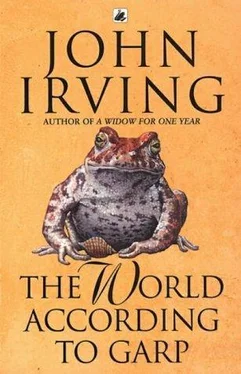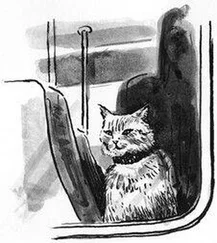“How did he know who his master was?” Walt asked.
“I don't know,” Garp said. “After the war, he got a new master. This master owned a cafй in the city; you could get coffee and tea and drinks there, and read the newspapers. At night the master would leave one light on, inside the cafй, so that you could look in the windows and see all the wiped-off tables with the chairs upside-down on the table tops. The floor was swept clean, and the big dog paced back and forth across the floor every night. He was like a lion in his cage at the zoo, he was never still. Sometimes people would see him in there and they'd knock on the window to get his attention. The dog would just stare at them—he wouldn't bark, or even growl. He'd just stop pacing and stare, until whoever it was went away. You had the feeling that if you stayed too long, the dog might jump through the window at you. But he never did; he never did anything, in fact, because no one ever broke into that cafй at night. It was enough just having the dog there; the dog didn't have to do anything.”
“The dog looked very mean,” said Walt.
“Now you've got the picture,” Garp told him. “Every night was the same for that dog, and every day he was tied up in an alley beside the cafй. He was tied to a long chain, which was tied to the front axle of an old army truck, which had been backed into the alley and left there—for good. This truck didn't have any wheels.
“And you know what cinder blocks are,” Garp said. “The truck was set on blocks so it wouldn't roll an inch on its axles. There was just enough room for the dog to crawl under the truck and lie down out of the rain and the sun. The chain was just long enough so that the dog could walk to the end of the alley and watch the people on the sidewalk and the cars in the street. If you were coming along the sidewalk, you could sometimes see the dog's nose poking out of the alley; that was as far as the chain would reach, and no farther.
“You could hold out your hand to the dog and he would sniff you, but he didn't like to be touched and he never licked your hand the way some dogs do. If you tried to pat him, he would duck his head and slink back into the alley. The way he stared at you made you think it would not be a very good idea to follow him into the alley, or to try very hard to pat him.”
“He would bite you,” Walt said.
“Well, you couldn't be sure,” Garp said. “He never bit anyone, actually, or I never heard about it if he did.”
“You were there?” Walt said.
“Yes,” Garp said; he knew that the storyteller was always “there.”
“Walt!” called Helen; it irritated Garp that she eavesdropped on the stories he told the children. “That is what they mean by “a dog's life,” Helen called.
But neither Walt nor his father appreciated her interruption. Walt said, “Go on with the story. What happened to the dog?”
The responsibilities loomed for Garp, every time. What is the instinct in people that makes them expect something to happen ? If you begin a story about a person or a dog, something must be going to happen to them. “Go on!” Walt cried impatiently. Garp, caught up in his art, frequently forgot his audience.
He went on. “If too many people held out their hands for the dog to sniff, the dog would wall back down the alley and crawl under the truck. You could often see the tip of his black nose poking out from under the truc. He was either under the truck or at the sidewalk end of the alley: he never stopped in between. He had his habits and nothing disturbed them.”
“Nothing?” Walt asked, disappointed—or else worried that nothing was going to happen.
“Well, almost nothing,” Garp admitted, and Walt perked up. “Something bothered him: there was just one thing. It alone could make the dog furious. It was the only thing that could even make the dog bark. It really drove him crazy.”
“Oh sure, a cat !” cried Walt.
“A terrible cat,” said Garp in a voice that made Helen stop rereading The Eternal Husband and hold her breath. Poor Walt, she thought.
“Why was the cat terrible?” Walt asked.
“Because he teased the dog,” Garp said. Helen was relieved that this was, apparently, all that was “terrible.”
“Teasing isn't nice,” Walt said with knowledge; Walt was Duncan's victim in the area of teasing. Duncan should be hearing this story, Helen thought. A lesson about teasing is clearly wasted on Walt.
“Teasing is terrible ,” Garp said. “But this cat was terrible. He was an old cat, off the streets, dirty and mean.”
“What was his name?” Walt asked.
“He didn't have a name,” Garp said. “Nobody owned him; he was hungry all the time, so he stole food. Nobody could blame him for that. And he had lots of fights with other cats, and nobody could blame him for that either, I suppose. He had only one eye; the other eye had been missing for so long that the hole had closed and the fur had grown over where the eye had been. He didn't have any ears. He must have had to fight all the time.”
“The poor thing!” Helen cried.
“Nobody could blame that cat for the way he was,” Garp said, “except that he teased the dog. That was wrong; he didn't have to do that. He was hungry, so he had to be sneaky, and nobody took care of him, so he had to fight. But he didn't have to tease the dog.”
“Teasing isn't nice,” Walt said again. Very definitely Duncan's story, Helen thought.
“Every day,” said Garp, “that cat would walk down the sidewalk and stop to wash himself at the end of the alley. The dog would come out from under the truck, running so hard that the chain wriggled behind him like a snake that's just been run over in the road. You ever seen that?”
“Oh sure,” Walt said.
“And when the dog got to the end of his chain, the chain would snap the dog's neck back and the dog would be tugged off his feet and land on the pavement of the alley, sometimes knocking his wind out or hitting his head. The cat would never move. The cat knew how long the chain was and he would sit there washing himself with his one eye staring at the dog. The dog went crazy. He barked and snapped and struggled against his chain until the owner of the cafй, his master, would have to come out and shoo the cat away. Then the dog would crawl back under the truck.
“Sometimes the cat would come right back, and the dog would lie under the truck for as long as he could stand it, which was not very long. He'd lie under there while the cat licked himself all over out on the sidewalk, and pretty soon you could hear the dog begin to whimper and whine, and the cat would just stare down the alley at him and go on washing himself. And pretty soon the dog would start to howl under the truck, and thrash around there as if he were covered with bees, but the cat would just go on washing himself. And finally the dog would lunge out from under the truck and charge up the alley again, snapping his chain behind him—even though he knew what would happen. He knew that the chain would rip him off his feet and choke him, and throw him on the pavement, and that when he got up the cat would still be sitting there, inches away, washing himself. And he'd bark himself hoarse until his master, or someone else, would shoo the cat away.
“That dog hated that cat,” Garp said.
“So do I ,” Walt said.
“And so did I,” said Garp. Helen felt herself turn against the story—it had such an obvious conclusion. She said nothing.
“Go on,” Walt said. Part of telling a story to a child, Garp knew, is telling (or pretending to tell) a story with an obvious conclusion.
“One day,” said Garp, “everybody thought the dog had finally lost his mind. For one whole day he ran out from under the truck and all the way up the alley until the chain jerked him off his feet: then he'd do it again. Even when the cat wasn't there, the dog just kept charging up the alley, throwing his weight against the chain and heaving himself to the pavement. It startled some of the people walking on the sidewalk, especially the people who saw the dog coming at them and didn't know that there was a chain.
Читать дальше












